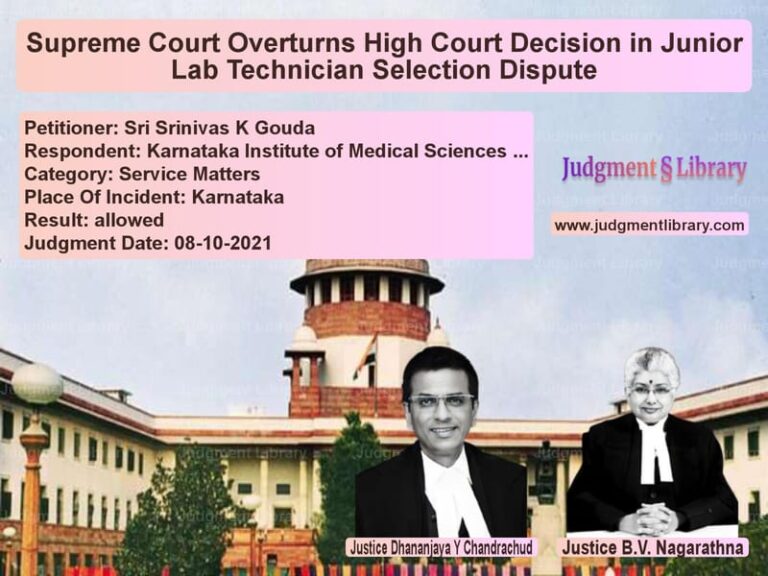Supreme Court Upholds Conviction in Tamil Nadu Double Murder Case
The Supreme Court of India, in the case of Meera Mydeen & Ors. vs. State of Tamil Nadu, upheld the conviction of the accused in a brutal double murder case that took place in Dindigul, Tamil Nadu. The judgment, delivered by a bench led by Justices A.K. Sikri and R.K. Agrawal, affirmed the conviction and life imprisonment of the accused, rejecting their plea for acquittal.
Background of the Case
The case dates back to January 10, 1997, when two individuals, Manicka Nadar (D-1) and Selvaraj (D-2), were murdered in an act of retaliation for the killing of a Muslim cleric, Mohammed Kasim. The prosecution argued that the attack was carried out by a group of individuals with a common objective of avenging the earlier murder.
The prosecution’s case was based on the testimony of multiple eyewitnesses, forensic evidence, and the circumstantial linkage between the accused and the victims. The trial court convicted Accused Nos. 1 to 4 (A-1 to A-4) under Sections 302, 149, and 120B of the Indian Penal Code (IPC) and sentenced them to life imprisonment along with fines. The conviction was later upheld by the High Court.
Key Legal Issues Considered
- Was the conviction based on sufficient evidence?
- Did the prosecution establish a conspiracy under Section 120B of the IPC?
- Were the eyewitness testimonies credible and consistent?
- Did the accused receive a fair trial?
Arguments from Both Sides
Appellants’ (Accused) Arguments
- “The eyewitnesses were unreliable and provided conflicting statements.”
- “The prosecution failed to prove our direct involvement in the crime.”
- “The delay in recording witness statements cast doubt on the authenticity of the testimonies.”
- “The conviction was based on circumstantial evidence without direct proof.”
Respondent’s (State of Tamil Nadu) Arguments
- “The accused were identified at the scene of the crime by multiple witnesses.”
- “There was clear evidence of a premeditated attack, establishing a criminal conspiracy.”
- “The forensic and medical reports corroborated the prosecution’s case.”
- “The accused fled the scene, which further proves their guilt.”
Supreme Court’s Judgment
The Supreme Court upheld the lower court’s judgment, stating:
- “The prosecution provided sufficient evidence linking the accused to the crime.”
- “The testimonies of the eyewitnesses, corroborated by forensic evidence, establish guilt beyond a reasonable doubt.”
- “The motive behind the crime was clearly established through the sequence of events leading up to the murders.”
- “The High Court correctly rejected the appeal against conviction, and there is no reason for this Court to interfere.”
Analysis of the Judgment
The Supreme Court provided a detailed analysis of the case, emphasizing the following:
- The testimony of key witnesses (PW-2, PW-3, and PW-4) was credible and consistent.
- The accused were seen at the scene of the crime, armed with weapons.
- The forensic evidence confirmed that the victims died from stab wounds inflicted with the weapons recovered.
- The accused’s attempt to flee and avoid arrest further indicated guilt.
The Court further observed:
“Where credible eyewitness testimony aligns with forensic evidence, the burden shifts to the accused to provide a plausible alternative explanation. In this case, the accused failed to do so.”
Implications of the Judgment
This ruling has significant implications:
- It reinforces the validity of eyewitness testimonies when corroborated by forensic evidence.
- It upholds the principle that conspiracy can be inferred from circumstantial evidence.
- It strengthens the legal framework for prosecuting organized crime and retaliatory killings.
- It ensures that justice is served even in cases where the accused claim lack of direct evidence.
Conclusion
The Supreme Court’s decision in Meera Mydeen & Ors. vs. State of Tamil Nadu sets an important precedent for handling cases involving criminal conspiracies and retaliatory violence. By upholding the conviction, the Court reaffirmed the role of consistent witness testimony and forensic evidence in securing justice. The ruling underscores the need for stringent legal scrutiny in cases of organized crime, ensuring that perpetrators do not escape accountability.
Don’t miss out on the full details! Download the complete judgment in PDF format below and gain valuable insights instantly!
Download Judgment: Meera Mydeen & Ors. vs State of Tamil Nadu Supreme Court of India Judgment Dated 15-07-2016-1741873254071.pdf
Direct Downlaod Judgment: Direct downlaod this Judgment
See all petitions in Murder Cases
See all petitions in Attempt to Murder Cases
See all petitions in Criminal Conspiracy
See all petitions in Judgment by A.K. Sikri
See all petitions in Judgment by R K Agrawal
See all petitions in dismissed
See all petitions in supreme court of India judgments July 2016
See all petitions in 2016 judgments
See all posts in Criminal Cases Category
See all allowed petitions in Criminal Cases Category
See all Dismissed petitions in Criminal Cases Category
See all partially allowed petitions in Criminal Cases Category







